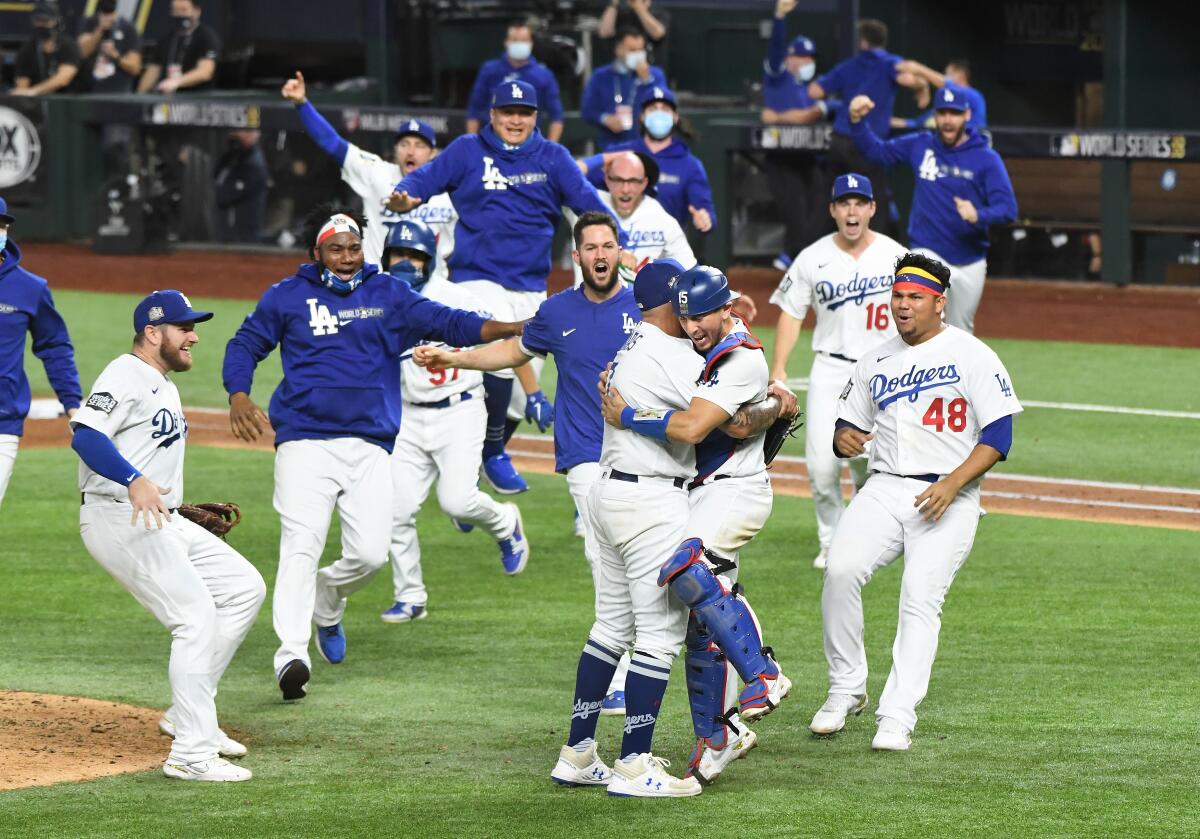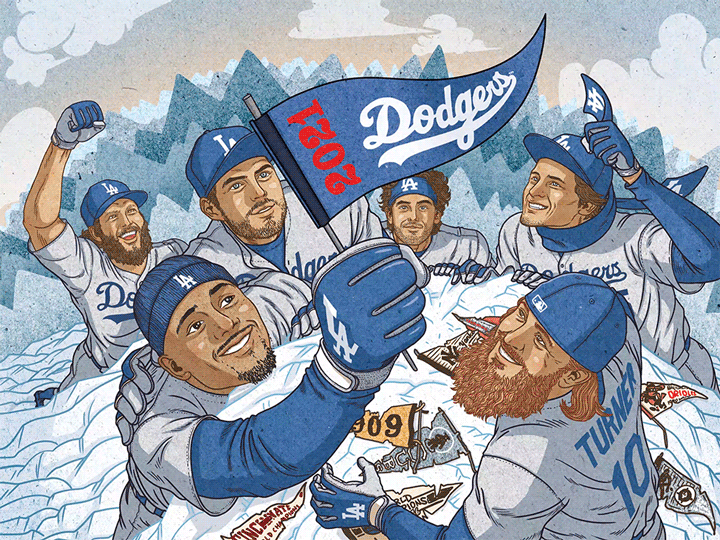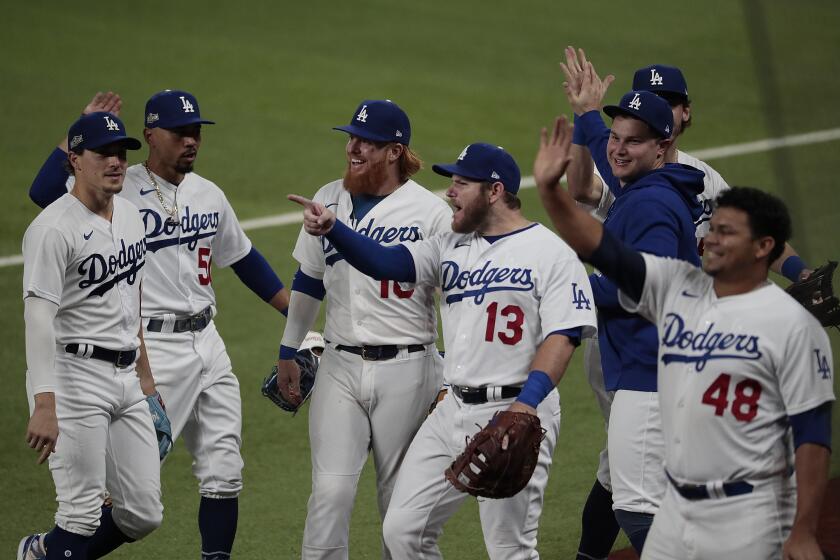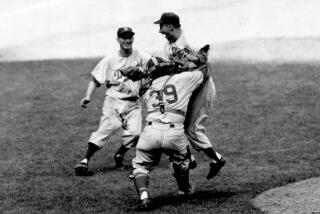Why’s it hard for World Series winners to repeat? That will be Dodgers’ big challenge

- Share via
PHOENIX — The lead architect of the Dodgers, the team favored to win the World Series again this year, observed his product behind Field 1 at Camelback Ranch on a recent afternoon. The sun radiated and the wind howled, diminishing the sounds from the intrasquad game underway.
Andrew Friedman, face covered by a blue Dodgers mask, oversaw building the roster that won his franchise’s first World Series title in 32 years. But that’s old news. His job, which started the day after Julio Urías threw the final pitch at Globe Life Field in October, is to put the Dodgers in the best position to end another drought.
Major League Baseball hasn’t had a team repeat as champion since the New York Yankees won a third straight title in 2000. The 20-season stretch is the longest ever in any of the four major men’s North American sports. The National Hockey League and the National Football League have had one repeat champion in the last two decades. Three teams in the National Basketball Association have won back-to-back titles four times — the Lakers have accomplished the feat twice — since the Yankees pulled it off.
MLB has had 14 clubs win at least two consecutive World Series in its history, beginning with the Chicago Cubs in 1907 and 1908. It’s been done seven times since Jackie Robinson broke the color barrier. But it hasn’t happened since Mariano Rivera closed out the New York Mets with Bill Clinton in the oval office.
The Dodgers have only gotten better since dominating en route to winning 2020 World Series title. In 2021, they’ll become the greatest team in MLB history.
Why is that?
“We tried to wrap our arms around it this offseason,” Friedman said.
Factors explaining the dearth have been theorized and examined. Injuries. Unlucky bounces. Bad calls. The postseason crapshoot, where the variables are magnified and the regular season becomes moot. The 2000 Yankees were proof that a regular season means only so much in modern baseball: They went 87-74, yet in the postseason defeated the Oakland Athletics, Seattle Mariners and Mets, all of whom won more than 90 games.
Friedman started with another element: complacency.
While front offices across the majors, led by Friedman and his lieutenants, have worked to master the quantifiable, complacency is qualitative. It’s human nature, and that’s less predictable. One method to combat it, Friedman said, is to change the roster and incorporate fresh perspectives.
“It’s really difficult to win a championship in baseball,” Friedman said. “Beyond that, there are different cautionary tales of things that different teams have cited. How much of it is an excuse? How much of it is real? But I sense that same tangible focus and drive to win this year that I did last year.”

The first step is compiling the talent, and the Dodgers have enough on paper. They feature three former most valuable players, three former Cy Young Award winners, two rookies of the year, and 13 players with at least one All-Star season on their resumes after signing Trevor Bauer and re-signing Justin Turner to complete the offseason. The league’s television network placed nine Dodgers in its top 50 list. Their payroll is the highest in the majors by about $50 million.
The question marks — in the bullpen and bench — are minor. Humans and computers project the team will win at least 100 games and claim its ninth straight division title. Vegas pegs the Dodgers as the clear-cut favorites to win the World Series. But it’s March. Recent history has proven predicting the next seven months is a foolish exercise.
Nobody knows that more than Bruce Bochy. The retired manager guided the San Francisco Giants to a championship every other year from 2010 through 2014. Their first repeat attempt hit a snag almost immediately.
The 2010 Giants won 92 season games and the organization’s first title in 56 years behind Buster Posey. The catcher established himself as a major leaguer and won the National League rookie of the year award. The next season, he broke his left leg and tore three ankle ligaments in a home-plate collision in May. Posey missed the rest of the year. The Giants hung tight in the playoff race but stopped hitting in August. They went 86-76 and missed the postseason.
“You look at late July, we were right there and then we kind of fell apart,” Bochy said. “But I really felt, because we got used to winning, that we were going to get back to the postseason that year. And I was a little surprised we didn’t.”
“This room knows how difficult that is, how big of a challenge it is just to make it to the World Series.”
— Justin Turner, Dodgers third baseman on the challenge of winning the World Series
The Giants won 94 games in 2012 and swept the Detroit Tigers in the World Series before going 76-86 and missing the playoffs again in 2013. An 88-win wild-card team rode Madison Bumgarner to a championship in 2014. They kept the pattern going, missing the playoffs in 2015, until they lost in the division series in 2016 following an 87-win season. The Giants haven’t returned to the playoffs since.
Bochy’s Giants fell to the Cubs in 2016. The Cubs then won their first World Series since 1908, ending a 108-year skid. Angels manager Joe Maddon managed those Cubs. They went to the NL championship series for the third straight year in 2017, losing to the Dodgers, but the Cubs haven’t won a playoff game since.
“The primary reason, I think, is because 162 [games] followed by this elaborate playoff system,” Maddon said. “That will wear you out. … And, on the human side, although I think it’s less critical, it’s just the fact that once you’ve done it, you really have to be unusual, push yourself, push yourself, push yourself, to get back to it again. That’s why you look at a [Tom] Brady in the NFL, LeBron [James], Michael Jordan back in the day, the certain players within organizations really drive the whole thing.”
The Dodgers’ last repeat effort didn’t reach October. The 1989 Dodgers went 77-83 and finished fourth in the NL West. Orel Hershiser, the team’s hero in 1988, posted a 2.31 earned-run average a year later, but run support was thin and he was charged with 15 losses.
Thirty-two years later, Hershiser is the color analyst for the team’s television network. In his eyes, the circumstances surrounding the Dodgers’ championship last year — the shortened season, the fan limitations, winning it in a strange ballpark, the lack of a true celebration — make this title defense different. He noted the San Diego Padres’ emergence as a contender — and aggressive offseason to solidify their standing — also will serve as “a legitimate stimulus.”
National League West preview: The San Diego Padres are looking to turn the tables on the World Series champion Dodgers, who have won eight straight division titles.
“There are some places, in this scenario this year, where they don’t have to create some kind of fantasy in their head,” Hershiser said. “They’re going to have literal, realistic challenges.”
These Dodgers have experience in rebounding after long October runs, though in losses. They made back-to-back World Series appearances in 2017 and 2018. A hangover fogged their start in 2018, after losing to the Houston Astros in seven games the previous winter, and they were forced to claw back to win the division in a 163rd game. The following year they posted 106 wins, a franchise record, before a disappointing loss in the NLDS.
“This room knows how difficult that is, how big of a challenge it is just to make it to the World Series,” Turner said. “And then once you’re there, it’s even harder to win those last four games. So, hopefully, we can break this little dry spell like we broke 32 years of L.A. not having a championship.”
The dry spell is nearing drinking age. It’ll be 21 years by the time the next World Series champion is crowned in October. The Dodgers are built to end the drought. They’re expected to. Recent history isn’t on their side, but it wasn’t last year either.
More to Read
Are you a true-blue fan?
Get our Dodgers Dugout newsletter for insights, news and much more.
You may occasionally receive promotional content from the Los Angeles Times.













